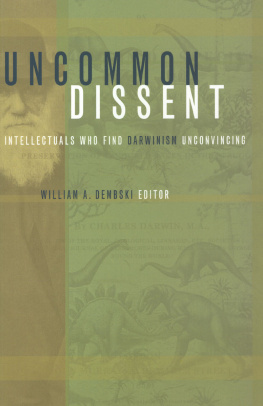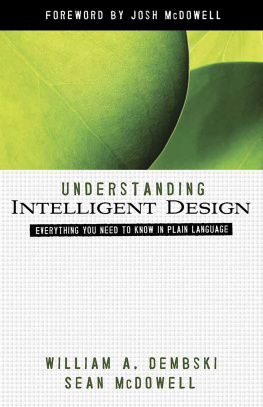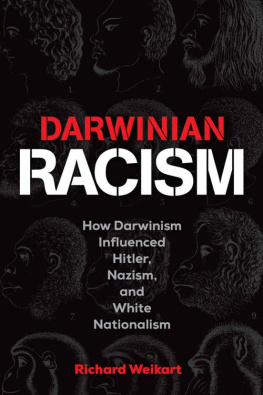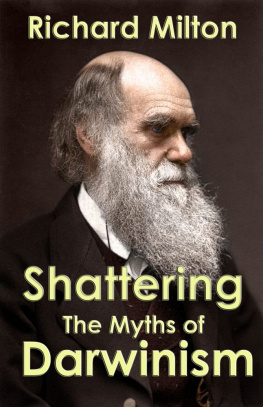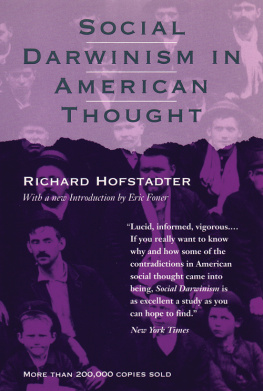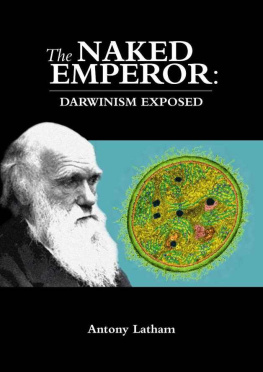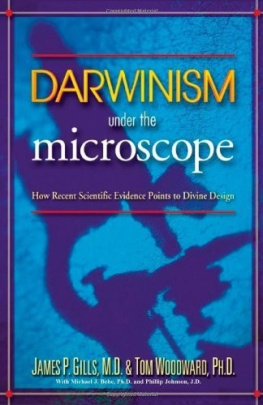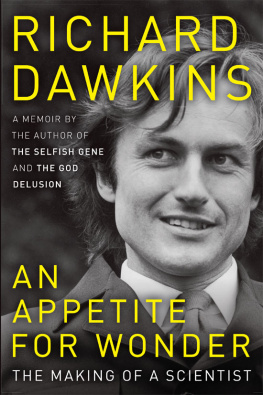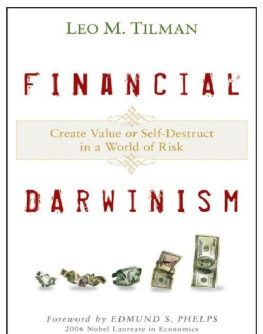U NCOMMON D ISSENT
Intellectuals Who Find
Darwinism Unconvincing
Edited by William A. Dembski

W ILMINGTON , D ELAWARE
To the memory of Michael Polanyi,
for freeing inquiry from ideology
The purpose of freedom is to create it for others.
Bernard Malamud, The Fixer
C ONTENTS
Foreword
John Wilson
Introduction:
The Myths of Darwinism
William A. Dembski
1. The Check Is in the Mail: Why Darwinism Fails to Inspire Confidence
Robert C. Koons
2. Darwinism as Dogma: The Establishment of Naturalism
Phillip E. Johnson
3. The Miracles of Darwinism
Marcel-Paul Schtzenberger 1996 Interview with La Recherche
4. Darwin Meets the Berenstain Bears: Evolution as a Total Worldview
Nancy R. Pearcey
5.Teaching the Flaws in Neo-Darwinism
Edward Sisson
6. Accept No Imitations: The Rivalry of Naturalism and Natural Law
J. Budziszewski
7. Refereed Journals: Do They Insure Quality or Enforce Orthodoxy?
Frank J. Tipler
8. A Catholic Scientist Looks at Darwinism
Michael J. Behe
9. An Anti-Darwinian Intellectual Journey: Biological Order as an Inherent Property of Matter
Michael John Denton
10. Why I Am Not a Darwinist
James Barham
11. Why Evolution Fails the Test of Science
Cornelius G. Hunter
12. Darwinian Evolutionary Theory and the Life Sciences in the Twenty-First Century
Roland F. Hirsch
13. Cheating the Millennium: The Mounting Explanatory Debts of Scientific Naturalism
Christopher Michael Langan
14. The Deniable Darwin
David Berlinski
A CKNOWLEDGMENTS
T he contributors to this volume are to be commended for a provocative and illuminating set of pieces. All but three were specifically commissioned for this collection. The exceptions are the essays by Phillip Johnson and David Berlinski and the interview with Marcel-Paul Schtzenberger.
Thanks are due Fr. Richard John Neuhaus and the editors at First Things for permission to reprint the Johnson essay (which appeared in the October/November 1990 issue) as well as for opening the pages of that journal to dissent from Darwinism.
Thanks are also due Dennis Wagner, head of Access Research Network (ARN), for permission to reprint the Schtzenberger interview. ARN originally published the interview through its journal Origins & Design (in the spring of 1996, volume 17, number 2). Paul Nelson, the editor of that journal, arranged for David Berlinski to do the translation.
I must thank the editors at Commentary for permission to reprint Berlinskis essay The Deniable Darwin (which appeared in June 1996) along with his responses to critics in Denying Darwin (the title given by Commentary to the correspondence that Berlinskis essays elicited and which was published in September 1996).
Also to be thanked are the following letter-writers, who gave permission to have their letters critical of Berlinskis essay to be reprinted here: H. Allen Orr, Richard Dawkins, Daniel C. Dennett, Arthur M. Shapiro, Paul R. Gross, and Eugenie C. Scott.
In addition, thanks are due to John Wilson, the editor of Books & Culture, for writing a foreword that helpfully situates the pieces collected here within the broader cultural conversation. Books & Culture, like First Things and Commentary, provides a model for how the debate surrounding Darwinism should be handled: informed discussion without censorship.
Finally, Jeremy Beer, editor in chief at ISI Books, is to be commended for first envisioning this project, for seeing it to completion, and above all for having the courage to face the opposition that invariably arises when Darwinism is questioned.
In the April 7, 2003, issue of the Harvard Crimson, Richard T. Halvorson, then an undergraduate, wrote, We must refuse to bow to our cultures false idols. Science will not benefit from canonizing Darwin or making evolution an article of secular faith. We must reject intellectual excommunication as a valid form of dealing with criticism: the most important question for any society to ask is the one that is forbidden. With this volume, the Intercollegiate Studies Institute continues its long and celebrated tradition of asking the forbidden questions and thereby refusing to bow to our cultures false idols.
John Wilson
F OREWORD
F or years now, the New York Review of Books has been sending a direct-mail letter that asksin bright red lettersAre you an intellectual? I was glad to see that the subtitle of Uncommon Dissent is Intellectuals Who Find Darwinism Unconvincing. Intellectual is a perfectly good noun that has fallen on hard times, particularly among conservatives, where it is almost always used pejoratively.
An intellectual may be, but is not necessarily, a specialist. Not all academics are intellectuals; not all intellectuals are academics. To be an intellectual is to possess a hungry mind and a willingness to question received opinion. But, contrary to a fashionable perversion of the intellectuals calling, intellectual is not a synonym for skeptic. Healthy skepticism is indeed essential to the intellectual life, but it must not become an end in itself. There is a reality to which we are all accountable, a reality that invites our understanding.
Since you have picked up Uncommon Dissent, theres a good chance that you would have to answer yes to the NYRBs question. And you may already know that the book youre holding is dangerous; it may get you into trouble. By questioning Darwinism, you place yourself in the company of all the cranks who have violated the taboos enforced by our current opinion-makers.
In many settings, the contempt of the enlightened wont affect you. If, however, you are teaching at a college or university, the costs may be considerable. (False dramatics? Not at all. The art of blackballing is practiced with great skill and ruthlessness in academia.)
Of course, the ferocity of resistance merely underlines the need for informed dissent. The almost comically hyperbolic arrogance of the Darwinian establishment, well documented in William Dembskis introduction to this volume, is representative of a larger malaise. As Steve Fuller observes in his new book, Kuhn vs Popper: The Struggle for the Soul of Science,
Poppers view that a non-scientist might criticize science for failing to abide by its own publicly avowed standards is rarely found inside academia today. For those who have inherited Kuhns Cold War belief that normal science is a bulwark in a volatile world, it comes as no surprise that philosophers today would sooner criticize creationists for violating evolutionary strictures than evolutionists for violating more general scientific normsan activity for which Popper had been notorious.
But theres another, subtler danger to which almost every reader of this book is potentially vulnerable. The role of dissenter can be costly, but it can also be powerfully seductive. How easy it is, after reading a book such as this, to puff oneself up with pride, to wax dogmatic about the crumbling edifice of evolutionary theory, and to fall into the very arrogance that is characteristic of Darwinism at its worst.
If you really are an intellectual, and not what Solzhenitsyn calls a smatterer, you will finish this book with more questions than answers. You wont simply accept the assertions of the authors gathered here, themselves a very diverse bunch; youll subject them to the same sort of searching critique they have brought to bear on Darwinism.

